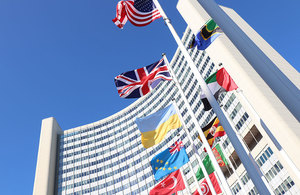UK General Statement at the 60th session of the Scientific and Technical Subcommittee of COPUOS
Delivered by Deputy Ambassador Nicola Murray at the United Nations in Vienna on 6 February 2023.

Chair, Distinguished Delegates,
Before the United Kingdom makes its general statement, let me first clearly state that the UK continues to stand in solidarity with the people of Ukraine and calls upon the Russian Federation to end its illegal war and respect the territorial integrity of other Member States.
Now let me move onto the UK General Statement within which the Delegation of the United Kingdom is pleased to have the opportunity to share with you the progress and developments we have made since the last meeting of this sub-committee.
In November last year, the UK reaffirmed its commitment to international collaboration of space missions and the development of new technologies through a 14% increase in its annual funding for ESA. An example of this is the upcoming Jupiter Icy moons Explorer (JUICE) mission, due for launch in April this year which will make detailed observations of Jupiter and its three large ocean-bearing moons Ganymede, Callisto and Europa. The mission will carry a range of science instruments including the J-MAG, a Magnetometer which is led by Imperial College London in the UK and will seek to characterize the Jovian magnetic field, its interaction with the internal magnetic field of Ganymede, and to study the subsurface oceans. The UK also celebrates the success of Artemis 1 in November last year and looks forward to collaborating with the US and international partners in a new and sustained programme of human exploration to the Moon.
On January 9th 2023, the UK conducted its first ever launch from UK soil through Virgin Orbit at Spaceport Cornwall. While the rocket reached space, it did not reach the intended orbit and could not complete its mission successfully. Despite this, the project has succeeded in creating a horizontal launch capability in the United Kingdom, and we remain committed to becoming the leading provider of commercial small satellite launch in Europe by 2030.
Space Sustainability continues to be a key priority for the UK. Notable highlights from the last year include: the hosting of the 4th Summit for Space Sustainability in June alongside the Secure World Foundation, the announcement of a Space Sustainability Standard to be developed by industry in partnership with government, the commencement of two mission studies that will establish the preliminary design and programmatics of a national Active Debris Removal Mission and the launch of a third project with UNOOSA, entitled Awareness-raising and capacity-building related to the implementation of the Guidelines for the Long-term Sustainability of Outer Space Activities. The UK also established a new project with UNOOSA to enhance international expertise in the registration of objects launched into outer space which we see as a crucial enabler for transparency, capacity building and novel missions.
To support its work on sustainability the UK also acknowledges the critical role and important work of the Inter-Agency Debris Coordination Committee (IADC) whose guidelines remain the most effective method to reduce the long-term environmental impacts of global space activity.
The UK delegation recognizes the continuing, constructive work of the working group on the use of nuclear power sources in outer space and looks forward to receiving its draft report at this session. We would again like to offer our thanks to Dr Sam Harbison, as he steps down as chair of the working group, for his long-serving and excellent leadership of the working group.
The UK also recognises the need for continued dialogue on the Dark and Quiet Skies topic and looks forward to discussions on the subject of extending the single year agenda item and the establishment of an expert group.
Finally, Chair, distinguished delegates, we look forward to a constructive session to further our cooperation and dialogue in the exploration and peaceful uses of outer space.